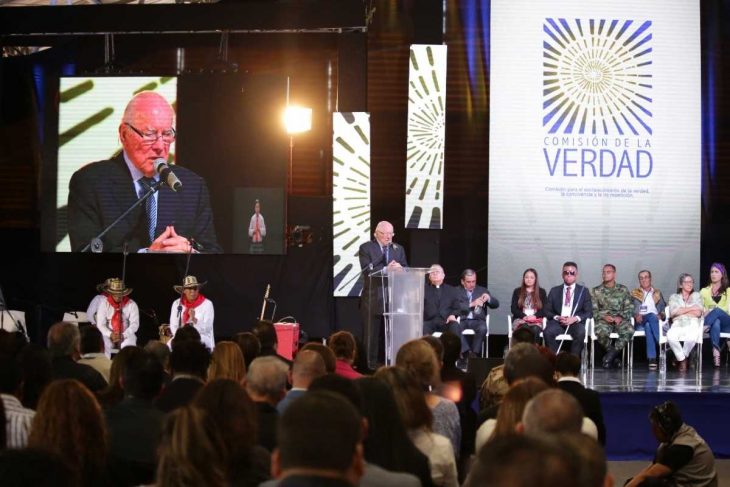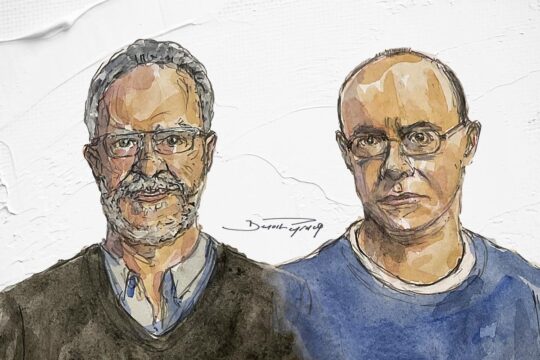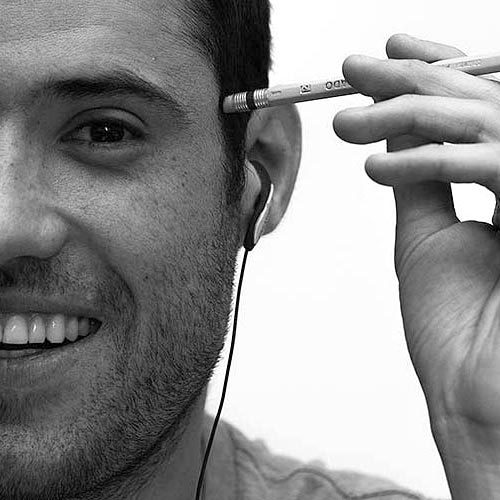Two weeks ago, former Defence Minister Juan Carlos Pinzón set off a political storm, after accusing “the majority of members” of Colombia’s Truth and Reconciliation Commission (TRC) of “having an ideological affinity or ties to armed groups”, without offering any evidence. His suggestion that commissioners are in cahoots with illegal groups sparked widespread outrage, which didn’t subside even after he met with the TRC’s president, Father Francisco de Roux, but then penned an open letter doubling down on his claim.
In many ways, Pinzón – who heads a policy institute created by prominent business leaders - is an improbable critic. He worked for 12 years with former President Juan Manuel Santos, who signed the 2016 peace deal with the Revolutionary Armed Forces of Colombia (FARC) that created the TRC, as his chief of staff, Defence minister and ambassador in Washington. Since running as a presidential candidate in 2018, he distanced himself from his mentor, even assuring he’d secretly voted ‘No’ in the 2016 plebiscite on the accord after campaigning for it.
His unsubstantiated accusation, however, obscured a more significant critique: Pinzón also ventured that TRC members have a left-wing political bias – “aligned with one of the sides which wants its version of events to become a unique truth”, in his words - and suggested the three institutions in Colombia’s transitional justice system should add new members to widen their credibility. That perception underscores one of the TRC’s most pressing challenges: it must still gain the trust of sectors of Colombian society that have been sceptical of its work, including business leaders, conservative politicians, religious figures and the military. While it has made inroads with most, it has noticeably struggled with the private sector.
Business leaders in the blind spot of the TRC
Although most business leaders and industry trade groups shy away from Pinzón’s rhetoric, in private many of them share his perception of a political bias at the TRC. A 2017 tweet by commissioner Lucía González, celebrating that FARC created their political party and stating that she shared their principles, was resurrected and inflamed things further.
It’s a problem they had from the outset. The TRC’s public selection process – led by a former and a current UN special rapporteur - yielded a diverse group of commissioners, including an Afro-Colombian community organiser, an indigenous lawyer, a retired Army major, an investigative journalist, a museum director, a feminist researcher, a public health expert and a psychologist whose work has centred on victims. At its helm is Father de Roux, a Jesuit priest with a Ph.D. in economics who led a successful regional peace-building experiment.
Their backgrounds, more oriented towards on-the-ground work than academic research, has been well suited for a victim-centred approach to truth-seeking on how Colombia’s 52-year-long armed conflict affected the 20 population groups pinpointed in the TRC’s mandate. But it hasn’t helped with three specific groups also prioritised - farmers, cattle ranchers and business leaders. Their distance has been mutual: no commissioner has a private sector background, but also no significant business leaders applied in the public selection process.
An opportunity to bridge that gap emerged when the TRC elected a new commissioner this April, after writer Alfredo Molano died in late 2019. However, once again no candidates with private-sector backgrounds came forward and Alejandro Castillejo, an anthropologist who worked in Peru’s TRC and studied the South African transition, was chosen.
Business leaders have stressed that thousands of entrepreneurs were victims of extortion, kidnapping or murder, while hundreds of companies were pillaged, forced to shut down or simply operated in regions where there was no state presence, a reality they consider Colombians have failed to acknowledge. On the other hand, human rights groups denounce that companies and businessmen voluntarily funded or advised groups like the paramilitaries, something the private sector has been reluctant to admit even though at least one – US banana-exporting giant Chiquita - pleaded guilty to making payoffs. There are also numerous grey areas, such as distinguishing between extortion and financing terrorism.
Without frank conversations about such issues, it will be difficult for a more complex narrative about the private sector during conflict to emerge.
Timid outreach efforts
The TRC has tried to make up for this limitation in a number of ways. It invited Henry Éder, head of a major sugar manufacturer and son of one of FARC’s earliest kidnapping and murder victims, as one of the speakers during its inauguration in November 2018. It included David Bojanini, until recently the CEO of Colombia’s largest insurance company and a widely respected civic voice, in its advisory council. Both he and Gonzalo Restrepo, another former CEO who was part of the peace negotiating team, have facilitated meetings with prominent private sector leaders.
In general, the commission has relied on its president Father de Roux to speak to businessmen, given his past experience in mediation. As an example, he helped create a 12-person group – including a former mining minister, a CEO, an environmental scientist and Afro-Colombian and indigenous leaders - that came up with a proposed roadmap for national public policy on mining.
The TRC has held dozens of private meetings with private sector leaders and published a booklet specifically tailored to them, explaining the nature of its work combining an in-depth report and public hearings seeking to enable collective catharsis over mass atrocities. But as the commission just reached the midpoint of its three-year term, breakthroughs have been timid at best and trust between both runs low.
Different outreach efforts have hit all sorts of snags. The TRC has in general prioritised reaching out to trade industry guilds as a way to then access individual business owners, but meetings have often been awkward and usually involve corporate responsibility directors or mid-level managers instead of their heads. “Speaking about non-recurrence creates the impression that we did something wrong” or “We need guarantees” are common lines of conversation when asked to sit down with the TRC.
Mutual distrust and low interest
Meetings have been even tenser when lawyers have been present. They have often asked TRC officials if there is any incriminating information against their clients and mentioned non-disclosure agreements as preconditions. “When companies send their lawyers first, you immediately lose the opportunity to have a meaningful conversation,” says an outside observer who has tried to help bridge that gap and who was granted anonymity for this story to discuss the issue candidly.
Most efforts haven’t been successful. Several persons with direct knowledge of the problem say that the TRC’s decision to channel efforts through industry trade groups was a mistake, since they often adopt defensive stances to protect members’ interests, while others contend that the organ’s lack of internal coordination has also put them off. One large company even complained that two commissioners knocked on their door separately with differing messages. An executive who attended a public hearing on the alarming rise in violence against human rights defenders, which the TRC convened to raise awareness, was initially concerned that his invitation as a ‘witness’ could mean he was being summoned.
Given this mutual mistrust, several civic and business-minded organisations began discussing how to help the commission and the private sector come together. Their informal working group rapidly was joined by the ANDI, Colombia’s most powerful business association, and then by the TRC itself. They met with Oxford scholar Leigh Payne, who has worked extensively on the issue. But after a year of discussions their only breakthrough was a methodological protocol, which hasn’t translated into a more fluid relation.
“Talking about the private sector with the TRC has been incredibly difficult and talking with business leaders about the commission has been just as complicated. But even that procedural document could have led to something else if there was more willingness from both sides,” says another person who has tried to act, in her own words, as “a simultaneous translator” between both. In the end, the TRC has been more successful in reaching small business owners and cattle ranchers in rural areas, who don’t feel as identified with national guilds and who are more concerned about reconciliation on a local level.
Distrust in NGO reports
In total, the TRC has received 204 reports and spoken to 17.475 persons. But most business leaders fear that the TRC is close to human rights and victims’ NGOs, many of which have named and shamed companies in the past. Their perception is compounded by the fact that a majority of the commission’s researchers come from academia or social organisations.
The TRC has insisted that every report it receives remains confidential, doesn’t represent its view and will be thoroughly corroborated and verified. But some NGOs have released their reports anyways. In May, several businessmen expressed their dismay after a newspaper published details from a report by the José Alvear Restrepo Lawyers’ Collective on companies and the conflict, right after submitting it.
Meanwhile, organisations with ties to the business world have tried to persuade its leaders that they should focus on providing their view of events, instead of shying away from it. A research effort by Ideas for Peace Foundation, Colombia’s leading think tank on peace and security issues, concluded that, after analysing 56 reports from national and international NGOs from the previous decade, at least 81 companies, primarily in the agribusiness and extractive industries, had been mentioned in relation to human, labour and environmental rights violations vis-à-vis the conflict. That reality warranted, they argued, that companies and industry groups begin seeing the importance of speaking to the TRC.
Business leaders still fear that human rights NGOs might play a more influential role than simply providing information. An agreement between the TRC and Dutch NGO Pax for Peace to provide technical and financial support is seen by some executives as a sign of bias, given that the latter authored a searing report linking two coal mining companies with the paramilitaries. “In an exercise like the TRC’s of fostering dialogue amongst opposites, which begins building trust in order to then reach consensus, having an activist organisation like Pax as an ally does more to raise alarms than to soothe,” says a former executive from the mining sector.
Justice is what companies fear most
It wasn’t truth that originally worried the private sector, but justice. Most of their discussions on transitional justice centred on its judicial arm, the Special Jurisdiction for Peace (JEP), and the possible implications of being summoned as ‘third party actors’ who aided or abetted armed groups, two persons who regularly discussed these issues with business leaders coincide. Those fears were allayed in 2018 when the Constitutional Court overruled this in part, barring the tribunal from subpoenaing civilians but allowing them to voluntarily seek admission.
Once that concern dissipated, many began to fret about the TRC’s extra-judicial truth-seeking efforts. They don’t have any incentives to come forward, but two main fears: reputational risk and possible legal consequences in the future, even if information gathered by the TRC cannot be used in court. “They’re like skittish deer. Merely suggesting that someone could question their reputation terrifies them and nothing scares them as much as transitional justice,” says a person who has worked with them.
Political divisiveness stoked fears of a witch hunt even more. A disinformation campaign in the run-up to the 2016 peace plebiscite contended that the JEP would have jurisdiction to analyse the corporate responsibility of 57 companies mentioned during the proceedings of the Justice and Peace special court for the former paramilitaries over a decade ago. Although disproven, this campaign is still mentioned in business circles, two sources agree.
Several informal advisors have also lobbied the TRC to adopt a more comprehensive and nuanced view on the private sector. “I’ve seen the conversation change from how to get businessmen to acknowledge responsibilities to how to incorporate their perspective about what happened in Colombia. And how that doesn’t exclude seeking a number of private actors who do have to address certain events,” says one of them.
One result of those conversations has been the TRC’s decision to promote a research area on good practices to prevent and mitigate human rights violations, as part of its mandate – a first in the world for truth commissions - to document positive transformations as well. That could give companies and executives the opportunity to share other types of experiences.
A report commissioned - and then shelved
At least one major industry group, the ANDI, decided that business leaders had to submit a report too, after a group of Guatemalan industrialists advised it to play an active role in the transition and make sure their voice wasn’t left out of the TRC’s final report.
In 2017, they commissioned Jorge Giraldo Ramírez, Gloria Isabel Ocampo and Gustavo Duncan, three researchers at Eafit University whose academic work is respected across the political spectrum, to document the private sector’s experience over a 30-year-period. The university announced that its findings would be published in book-form and that Usaid had provided funding.
Then something odd happened. After the researchers presented their work to the ANDI in 2018, its board of directors blocked its publication and submission to the TRC. There is no clear explanation on the reasoning for their decision. One of the authors declined to discuss the issue and ANDI president Bruce MacMaster likewise did not respond to our questions.
Three persons with knowledge of the report attribute its shelving to clashing visions among business leaders regarding the peace deal. “These leaders want the TRC car to move forward, but with its handbrake on,” says a former oil executive. “The business world is still fractured: one part still supports the peace deal, a second one opposes it and a third one turns wherever the tide is stronger, which means they switched from backing the accord to being critical of it now [that Iván Duque, a critic of the deal, is president]. In the end, the long-held tradition of toeing the government’s line prevails,” another observer says.
Oil palm growers: a year-long prologue to talk
The TRC is still in conversations with a number of business groups, although progress has been very slow. Since mid-2019, it has been meeting with Fedepalma to discuss how to listen to oil palm growers’ experiences. They had reached preliminary agreements on what those listening spaces could be, including a report, a public act to hear their testimonies and private meetings to discuss some issues at length with commissioners.
In February conversations suddenly broke down. After several NGO presented a report on land dispossession in Colombia’s eastern plains and included a photo of a palm plantation in its poster, where the commission’s logo appeared as a sponsor, Fedepalma sent the commission a stern letter. It took another letter from TRC president De Roux, which was well received by the industry group, to reassure them, but the impasse set their discussions back a couple of months.
Oil palm growers are one of the five economic sectors that the TRC recently decided to prioritise, given their work in the rural areas most heavily hit by violence. It has also advanced in preliminary talks with Augura, the largest banana exporter guild. Talks with Fedegan, which groups cattle ranchers, have not advanced beyond an initial meeting in 2019 in which its president José Félix Lafaurie – a vocal critic of the TRC - handed their two published reports on how affiliates endured kidnapping, extortion and cattle theft by groups like FARC over decades. None of their presidents answered to Justice Info’s questions.
Finally, the embassies of Switzerland, Sweden and the Netherlands have been trying to facilitate dialogues with several companies, including mining ones, but their good offices have so far not had much success given that, as one observer puts it, “diplomats can only do so much.”
Two significant business voices have come closer to the TRC in recent days. State oil giant Ecopetrol, Colombia’s largest company, and the Colombian Petroleum Association participated on July 30, 2020 in the presentation of a report made by the Ideas for Peace Foundation detailing how their sector was affected during conflict, including an account of the 1.563 attacks just against the Caño Limón – Coveñas pipeline between 1985 and this year. According to the report, there were more than 3,600 attacks on oil infrastructure during the armed conflict.
These delays mean that the clock is ticking against the TRC, whose mandate ends in November 2021. But also for businessmen, if they heed the advice that if they don’t speak, others will in their place. Whether both can find a common ground will help determine what chances the transitional justice system has of fostering reconciliation among Colombians.







